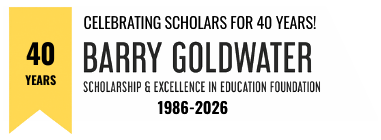LETTER WRITING GUIDANCE – RECOMMENDERS
Printable PDF of Letter Writer Guidance
LETTER WRITING GUIDANCE
The mission of the Goldwater Foundation is to identify and support the nation’s next generation of leaders in scientific, mathematical, and engineering research. Letters of Recommendation play a crucial role in helping the Goldwater Foundation identify the nation’s most promising talent.
Mentors should spend most of their time discussing the student’s involvement in and, most importantly, contributions to the research. Research mentors should keep their remarks about their own research program brief but provide enough detail for the reader to develop a general understanding of the work.
Please note that Information disclosed in the student’s research essay and other parts of the application will be kept confidential. All Foundation reviewers sign a Confidentiality and Conflict of Interest Agreement.
GUIDANCE FOR ALL RECOMMENDERS:
- If you do not know the student well enough to write a strong letter, the student has not given you enough time to write a letter, or you have other reasons that make you uncomfortable writing the student the kind of letter described below, please inform the student and decline to write the letter. A two-paragraph generic letter could jeopardize the nominee’s chances.
- Before agreeing to write a letter, engage in an in-depth discussion with the student about the student’s career and research aspirations.
- The more specific and detailed your letter is about the student, the stronger your letter will be. The Foundation suggests that students provide letter writers with an information packet tailored to the context in which you interacted with the student. The packet should help you develop insightful examples.
- Comments on student demeanor (e.g., gentle, kind, sweet, etc.) are not particularly helpful in evaluating a student’s likelihood of success in a research career. Instead, attributes typically required to become a successful research scientist, engineer, or mathematician are more relevant. Characteristics such as analytical, careful, deliberate, and persistent are more important, particularly when these qualities are supported by examples that demonstrate these characteristics.
- For letter writers from a student’s department or those who have relevant insights, it is helpful for the Foundation and its reviewers to understand:
-
- the extent to which research opportunities are available to the student,
- the nature of the research opportunities (academic year project, summer internship, course-based project, independent research, off-campus only through programs like NSF’s Research Experiences for Undergraduates), and
- how the student’s research performance represents exceptional research potential in relation to the available research opportunities.
LETTERS – FROM RESEARCH MENTORS
Your letter should assist the Foundation and its reviewers in the following ways:
- Provide context regarding your relationship with the student, including how long you have known them, in what capacity you interacted, and whether you were their direct supervisor.
- Describe the student’s contributions to the work and the significance of those contributions.
- Offer insight into the level of independence with which the student worked, including the amount of guidance they required.
- If the project involved a team effort, clarify what part of the work was handled by the student and how crucial their contributions were to the project’s success and completion.
- Share details about what the student already knows and can accomplish.
- Assess the student’s originality, intellectual daring, insight, creativity, perseverance, and integrity and, where possible, provide specific examples illustrating these traits.
- Compare the student to others who have successfully pursued research careers, providing insight into the likelihood that this student will also become a successful researcher.
- Explain what motivates the student’s interest in research.
**Letters from Non-Mentors**
Faculty and post-docs who have observed a Goldwater student but are not their mentor should:
- Describe the context in which they know the student.
- Focus on general characteristics observed that indicate the student will be a successful research scientist, mathematician, or engineer (e.g., persistence, ability to collaborate, and capacity to present complex ideas).
- Compare the student to others who have successfully pursued a PhD and research career.
**Letters from Course Instructors**
- Discuss aspects of the course relevant to the student’s research and career aspirations.
- Address how the student’s academic achievements demonstrate their ability and rigor to pursue a successful research career.
- Compare the student to others taught who have gone on to pursue successful research careers.
- Evaluate the student’s ability to understand complex topics and present ideas coherently.
- If applicable, mention the student’s involvement in extracurricular activities that showcase initiative, teamwork, and leadership relative to their development and contributions to the scientific community.
**Letters that are Not Helpful**
- Letters written for purposes other than this evaluation.
- Letters that fail to provide insights into the likelihood of the student pursuing a research career or do not suggest their potential to become a leader in research.
- Letters that merely state that a student studied hard and received an A, or that they are in the top percentage of the class, or that they get along well with others and have a sense of humor. Avoid vague superlatives that lack supporting examples.
